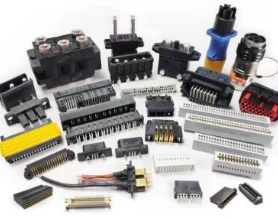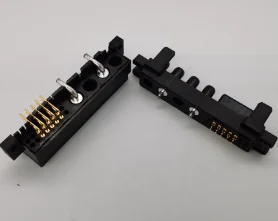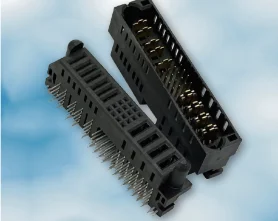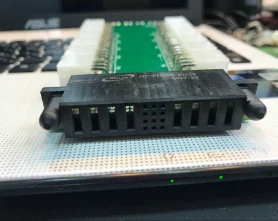MedlonUploaded:2024-02-27Browse:3093

Uninterrupted and reliable power supply is essential for our daily lives, whether it's for our homes, offices, or on-the-go needs. That's why we are excited to introduce our range of high-quality and dependable power connectors. Designed to keep you connected and powered on, our connectors cater to a variety of devices and come equipped with advanced safety features. From traditional wall adapters to portable power banks, our products are built to withstand the demands of modern life and ensure that you never run out of power when you need it most. So why settle for less when it comes to powering your devices? Choose our power connectors and stay connected and powered on at all times.
Powering up your devices has never been easier with our top-of-the-line power connector solutions. We understand the frustration of constantly having to switch out cables and adapters just to keep your devices charged. That's why we have curated a collection of the best power connectors, ensuring compatibility with all your devices. Whether you're at home, in the office, or on the go, our connectors are designed to provide fast and efficient charging so you can always stay connected. Don't let a dying battery slow you down. Power up with our reliable and convenient power connector solutions today.

1.Are there any power connectors specifically designed for high-powered devices?
Yes, there are power connectors specifically designed for high-powered devices. These connectors are typically larger in size and have a higher current rating to accommodate the higher power requirements of the device. Some examples of high-powered connectors include the IEC 60309 (also known as the high-current connector")
2.Can a faulty power connector cause damage to my device?
Yes, a faulty power connector can potentially cause damage to your device. If the connector is not providing a stable and consistent power supply, it can cause fluctuations in the device's power input, which can lead to overheating, short circuits, and other electrical issues. Additionally, a faulty power connector can also cause physical damage to the device if it is not securely connected or if it becomes loose and causes the device to fall or get pulled off a surface. It is important to regularly check and replace any faulty power connectors to prevent potential damage to your device.
3.Can I use power connectors for both input and output functions?
No, power connectors are designed for either input or output functions, not both. They are designed to transfer power from a power source to a device or from a device to a power source, but not both simultaneously. Attempting to use a power connector for both input and output functions could result in damage to the connector or the devices connected to it. It is important to use the correct type of connector for each function to ensure safe and proper operation.
4.Can I install a power connector myself or do I need a professional?
It depends on your level of experience and comfort with electrical work. If you have experience with electrical work and feel confident in your abilities, you may be able to install a power connector yourself. However, if you are unsure or inexperienced, it is recommended to hire a professional to ensure the installation is done safely and correctly.

5.How do you properly connect a power connector to a device?
1. Identify the type of power connector: Before connecting the power connector, make sure you have the correct type of connector for your device. Common types of power connectors include USB, AC/DC adapters, and barrel connectors. 2. Turn off the device: Before connecting the power connector, it is important to turn off the device to avoid any potential damage. 3. Locate the power input: The power input is usually located on the back or side of the device. It is usually labeled with a symbol or the word power."
6.What is the difference between a power connector and an electrical socket?
A power connector is a device used to connect an electronic device to a power source, such as a wall outlet or power strip. It typically has two or three prongs that fit into corresponding slots in the socket. An electrical socket, also known as an outlet or receptacle, is a fixed device installed in a wall or power strip that provides a connection point for a power connector. It has slots or holes that match the prongs of a power connector and allows electricity to flow from the power source to the connected device. In summary, a power connector is the plug that goes into the socket, while the electrical socket is the fixed outlet that provides the connection point for the power connector.
7.What are the different types of power connectors available in the market?
1. AC Power Connectors: These are the most common type of power connectors used for connecting devices to a power source. They come in various shapes and sizes, such as the standard 3-prong plug used in North America or the 2-prong plug used in Europe. 2. DC Power Connectors: These connectors are used for low voltage devices and are commonly found in electronic devices such as laptops, routers, and other small appliances. They come in various sizes and shapes, such as barrel connectors, banana plugs, and USB connectors. 3. Coaxial Power Connectors: These connectors are used for transmitting high-frequency signals and are commonly used in cable TV, satellite TV, and internet connections. They have a cylindrical shape with a center pin and an outer ring. 4. Twist-Lock Power Connectors: These connectors are commonly used in industrial and commercial settings where a secure and reliable connection is required. They have a locking mechanism that prevents accidental disconnection. 5. Miniature Power Connectors: These connectors are smaller in size and are commonly used in portable electronic devices such as smartphones, tablets, and cameras. They come in various shapes and sizes, such as micro USB, mini USB, and lightning connectors. 6. Audio/Video Power Connectors: These connectors are used for transmitting audio and video signals and are commonly found in home theater systems, gaming consoles, and other multimedia devices. They come in various types, such as HDMI, RCA, and VGA connectors. 7. Battery Connectors: These connectors are used for connecting batteries to devices and come in various types, such as snap-on connectors, screw terminals, and spring-loaded connectors. 8. Solar Power Connectors: These connectors are specifically designed for connecting solar panels to batteries or other devices. They are weatherproof and can withstand high temperatures and UV exposure. 9. Automotive Power Connectors: These connectors are used in vehicles for connecting various electrical components, such as headlights, taillights, and audio systems. They are designed to withstand high temperatures, vibrations, and other harsh conditions. 10. Waterproof Power Connectors: These connectors are designed to be used in wet or outdoor environments and are commonly used in outdoor lighting, marine equipment, and other outdoor applications. They have a waterproof seal to protect the connection from moisture and dust.
8.What is the typical length of a power connector cable?
The typical length of a power connector cable is around 6 feet (1.8 meters). However, the length can vary depending on the specific device and manufacturer. Some power connector cables may be shorter or longer, ranging from 3 feet (0.9 meters) to 10 feet (3 meters).
